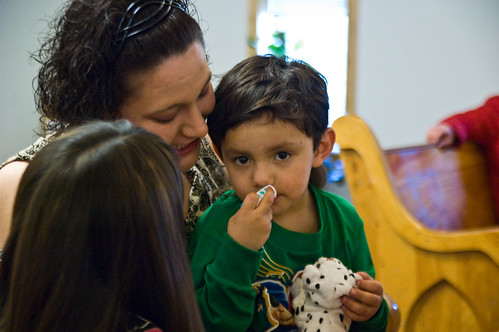 |
| Photo Credit: jeremy.wilburn |
"I have seen with my own eyes or know of houses in Latin America that have been painted 20 times by 20 different short-term teams; fake orphanages in Uganda erected to get Westerners to give money; internet centers in India whose primary purpose is to ask Westerners for money; children in African countries purposefully mutilated by their parents so they would solicit sympathy while they beg; a New England-style church built by a Western team in Cameroon that is never used except when the team comes to visit; and slums filled with big-screen TVs and cell phone towers.
I have seen or know of teams of grandmothers who go to African countries and hold baby orphans for a week every year but don't send a dime to help them otherwise; teams who build houses that never get used; teams that bring the best vacation Bible school material for evangelism when the national church can never bring people back to church unless they have the expensive Western material; teams that lead evangelistic crusades claiming commitments to Christ topping 5,000 every year in the same location with the same people attending."As one that has participated on a number of short-term missions teams, I do believe that these ministry opportunities can have lasting value. I've also experienced the other side as one that has received short-term missionaries into an unfamiliar ministry environment for them. I've dealt firsthand with the challenges of seeking to accommodate these well-meaning but inexperienced missionaries while also trying not to push away the people that will remain long after the missionaries return home.
In order for short-term mission trips to have the type of impact that most of us hope for, it is important for us to examine our motives and intentions in taking part in such endeavors. Before participating in a short-term mission trip, we would do well to ask ourselves several questions. These questions could include the following:
1. Is this trip about me or about the people I'm supposedly going to serve? Do I project the posture of a tourist or that of a servant?
2. Has our team already identified the needs of those we'll be serving without first talking to leaders in that community? Or have we sought their input on what will be most helpful for them?
3. Is our team contributing to an unhealthy dependence on outside resources when the ability to generate those resources might already exist among those we'll be serving?
4. Will we be eating the foods they eat, living in similar housing and respecting their customs and culture? Or will we refuse to identify with them while carrying a "superior" attitude?
5. Do we acknowledge that there are things that the people we'll be meeting have things to teach us and that they can be a blessing to us even as we hope to be a blessing to them?It is true that short-term mission trips can be unhelpful in some circumstances. But that doesn't have to be the case. When we approach others with a humble and teachable heart in which we are willing to serve and not be served, then we are helping to lay the groundwork for a positive experience for both short-term missionaries and those to whom they will be ministering.
To read the rest of Darren Carlson's eye-opening post on the Gospel Coalition blog please click here.
3 comments:
This makes me think of Haiti. I really like your questions as well. They were things we were told when we arrived in Haiti. I was already a little up in arms about this because I was dealing with the whole "white saviors coming to help the poor blacks" thing. I mean culturally this happens to us when people work in the inner city. The crazy part is that in Haiti they kept telling us, dont give out anything...you wont understand but we dont give out handouts we give hand ups. In my mind I was thinking...black people get this..but I realize it was a pride thing. Anywho, this is really good because I always think about how effective short term missions are. I mean the whole purpose of missionary is to go to a place find a "person of peace." Share the gospel with them, disciple them and train them to lead their own people. No handouts but hand ups. They know the culture far better than I and Im not going to impose my American lifestyle on another culture..American is not the best way contrary to popular belief, but these are excellent things to keep in mind as I seek to do more short term missions in other countries and even in different pockets in the U.S.
This is a great post, Scott. I'm glad to see the recent discussion in several circles focused on evaluating the effectiveness of short-term missions.
Like you I have seen both positive & negative effects of mission teams swooping in to do their thing. You ask good questions.
There is also the whole issue of how a short-term mission project impacts the ongoing saga of disicpleship of the go-er. The author you quote mentions short-termers who never gives a dime upon return - a sad reality. Our hope has always been that for the team member, this experience should be just one more step (albeit a major one) in a life of obedience and increasing maturity. So we have tried to incorporate the kinds of questions & activities that stimulate ongoing change & growth. However, I've seen my share of mission trips that provided NONE of that kind of introspection or accountability.
Thanks for your comments, Tyshan and Kaye. You both have some good insights. Good short-term trips will not only have a lasting effect on those ministered to but those doing the ministering. If neither has any change a couple weeks after it happened, save the time and money and do something else.
Post a Comment